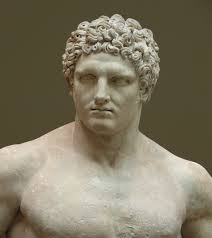Also on this page:
Greek Muses,
More Mythology Topics
More Topic Categories
Greek Heroes
 In Ancient Greek mythology, there are many myths around the adventures of valiant heroes, such as Heracles, Jason, Perseus, Odysseus, etc. Probably the best – known literary works are the Homeric Epics, the Iliad and the Odyssey, in which Homer recounts the great Trojan War as well as the return of Odysseus to his homeland.
In Ancient Greek mythology, there are many myths around the adventures of valiant heroes, such as Heracles, Jason, Perseus, Odysseus, etc. Probably the best – known literary works are the Homeric Epics, the Iliad and the Odyssey, in which Homer recounts the great Trojan War as well as the return of Odysseus to his homeland.The Homeric Epics include a number of well – known heroes, such as Achilles and Odysseus. Achilles was a central character in the Iliad, and considered the greatest warrior. His most notable feat during the Trojan War was the slaying of the Trojan hero Hector outside the walls of Troy. His demise is not mentioned in the Iliad but other sources inform us that he was killed by Hector’s brother, Paris, who shot an arrow that landed on Achilles’ heel. This was the only vulnerable point of Achilles, as his mother Thetis, who was a goddess, had made him invulnerable by immersing him in the waters of the Styx River; however, as she was holding him from his heel, the heel was not touched by the water and became the sole vulnerable point of the hero.
Odysseus’ ten – year – long adventures on his return voyage to his homeland after the end of the Trojan War are recounted in the Odyssey; the epic starts with Homer asking the Greek Muses to help him recount the story of this great man. Odysseus’ part in the Iliad was also of considerable value, as he was the designer of the Trojan horse, a device that allowed the Greek to infiltrate the city of Troy and lay ruin. On his way back home, he and his fellows were captured by the Cyclops Polyphemus, by the witch – goddess Circe, among others. He finally reached Ithaca ten years after he had initially set sail.
Heracles is one of the most famous Greek heroes. He was a man showing extraordinary strength, courage, ingenuity and sexual prowess with both males and females. The best – known tale around Heracles is the Twelve Labours; driven mad by Hera, Heracles slew his own children. To be redeemed, Heracles was told to carry out ten labours by Eurystheus, his archenemy. After completing them, Eurystheus did not accept two of the labours, one because Heracles accepted payment and another because he was helped by Iolaus. So, he was forced to complete two more labours. The Twelve Labours were: slay the Nemean Lion, slay the Lernaean Hydra, capture the Golden Hind of Artemis, capture the Erymanthian Boar, clean the Augean stables in a day, slay the Stymphalian Birds, capture the Cretan Bull, steal the Mares of Diomedes, get the girdle of Hippolyta, Queen of the Amazons, get the cattle of monster Geryon, steal the apples of the Hesperides, and finally capture Cerberus. Heracles later joined the Argonauts in their search for the Golden Fleece.
See Also:
 Athens Photos
Athens Photos
 Santorini Photos
Santorini Photos
 Crete Photos
Crete Photos
 Meteora Photos
Meteora Photos
 Corfu Photos
Corfu Photos

